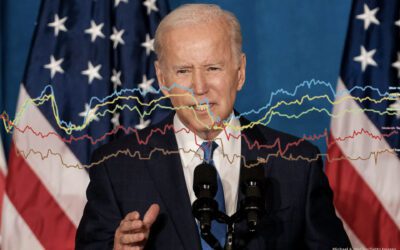All signs point to Hillary Clinton achieving a delegate majority in the Democratic nomination for President, but her image is being tarnished and defined by her ties to Wall Street. Despite ambitious plans to reform the financial sector and address big money in politics, doubts about Secretary Clinton persist due to her connections to Super PACs and Wall Street. Even Clinton’s own voters, who like her a lot, perceive her as close to the big banks and perhaps restrained in what she will do for the middle class. At the same time, Donald Trump’s message of self-funding and a willingness to expose a broken system, fueled by big money contributions, is breaking through and getting heard.
For Clinton, the good news is there is a way to turn her fortunes around, as you will see in this memo.
Democracy Corps conducted focus groups on behalf of Every Voice in Cleveland, Ohio on March 3rd in order to better understand the views of Democratic primary voters on the issue of money in politics. We spoke to one group of women Clinton voters ages 30-60 and one group of male Sanders voters, 18-45.
As Clinton recognized when she announced her four policy pillars, addressing money and politics is important for the country; and we now know, campaign spending and corporate influence is important to primary and general election voters. That reality is reflected in these groups where participants say, “the corporate voice should have no part of our process” and “you can’t continue to overhand [sic] everything to all these billionaires. The big money that shuts the people up and stops us from making the progress on the issues we care about. Exactly, straightforward.” (Clinton primary supporters)
These conclusions are elevated in a race where two candidates are trusted to take on special interests because they do not have a Super PAC and either self-fund or accept significant amounts in small personal donations.
Clinton’s price of silence is too high, particularly when her program is comprehensive but currently unknown to voters. In fact, both Clinton and Sanders voters think the Clinton platform is really from the Sanders campaign. This report suggests how to make a transition to get heard in a powerful way and we believe these findings are applicable beyond the presidential race to down ballot contests.
Starting point: scared, centrality of Wall Street influence, desire for change
The starting point with these Clinton and Sanders voters is the dark mood for country and strong desire for change. Their words to describe the direction of the country include “scared,” “nervous,” “worried,” “angry,” “terrified,” “saddened,” “disappointed,” and “concerned.” They are nervous for the country’s future and especially concerned about the economy, despite the much improved employment picture. At best they see our progress as tentative:
“I think it’s very fragile and shaky. We’ve made some general improvement, we’ve made strides and the unemployment rate has come down. But I get the sense that it could go either way.” (Clinton primary supporter)
“I worry that we’re gonna have another one of those meltdowns.” (Clinton primary supporter
At worst they think inequality is rampant and perhaps we have crossed the Rubicon: “I think things are out of control. The rich are getting richer. The gap between high class and low class is getting way bigger. (Clinton supporter)
They crave change, starting with special interests and particularly Wall Street: “I just think that things are out of control, and the middle class is failing.And I think that there needs to be some big time reform as far as big banks, Wall Street, those kinds of things.” (Clinton primary supporter)
Indeed, Wall Street and Super PACs are universally despised. Hillary supporters use strong language to describe these institutions. They are “gamblers,” “felons,” “out for themselves,” and “corrupt.” (Clinton primary supporters) They think “it feels like the liquidation of our democracy.” (Clinton primary supporter)
The primary challenge
To be sure, Secretary Clinton’s primary supporters are unwavering. They offer high praise of her resiliency, her ability to collaborate to accomplish goals, her experience, her willingness to take on tough challenges head on. They clearly believe that she is presidential and “the strongest choice to keep a Democrat in the White House.” (Clinton primary supporter) They also appreciate her tone and often repeat the language that she is using on the trail.
Still, many of her own voters talk about her taking donations from the big banks and Wall Street.
“Well if you look at the top organizations she has in her Super PAC, it’s JP Morgan, it’s these huge banks, it’s these investment banks that caused a lot of the crisis. My concern is her tie to that and the support that she’s getting from them.” (Clinton primary supporter)
“My concern was her Super PAC, and it’s all big banks and big business.” (Clinton primary supporter)
“Right now – too much support from Big Banks & Big Business. Tied to a Super PAC.” (Clinton primary supporter)
Ties to people with all of this money leads them to wonder if she can understand people like them? Is she really for the middle class?
“Does she really understand issues of middle class? Takes Donations from big banks – is she being bought by special interest groups?” (Clinton primary supporter)
“Basically this is my biggest issue with her. She says she understands but she is doing the opposite, she’s not coming from the place we are.” (Clinton primary supporter)
Among the Sanders voters, there is less of a question about which constituency she truly represents. It is settled that she “represents the wealthy.” (Sanders primary supporter) They suggest that she may in fact be a board member of a Wall Street bank. They think this means her hands will be tied to make changes as president: “I think that’s my biggest issue with her. I just, honestly, I do not believe her, that she’ll do anything for the reform.” (Sanders primary supporter)
These concerns lead Democratic voters to seriously question Secretary Clinton’s integrity.
“What will they expect if she does become president?” (Clinton primary supporter)
“She takes donations from the big banks, she’s being bought. That’s concerning.” (Clinton primary supporter)
“[She] will continue to be distrusted.” (Sanders primary supporter)
“Honesty, lying about [her] personal finances.” (Sanders primary supporter)
“I am worried about her being a liar.” (Sanders primary supporter)
Ammunition for opponents
Most voters do not yet fear these concerns will make her unelectable. They do believe that this is unnecessary “baggage” to be exploited by the opposition, whether that is in a general election or in office.
“Now they have a little bit of ammunition towards her, [Donald Trump is] just going to make it bigger and just run with it and keep digging and digging.” (Clinton primary supporter)
“They’re making a mountain out of a molehill, but they have the stage to do it and I think that it could highjack the election and it could highjack people’s perception of her. And I think Donald Trump will milk it mercilessly.” (Clinton primary supporter)
“I think it gives the republicans a lot of fire power, even if it’s not that true or big an issue.” (Clinton primary supporter)
Clinton’s supporters are most concerned by a potential attack questioning the Clinton Foundation’s acceptance of donations from foreign government during her time as Secretary of State. The Sanders supporters are deeply concerned about an attack on her hypocrisy for vowing to take on the banks while accepting large sums for Wall Street speeches and donations to her Super PAC.
They strongly agree that she cannot change the corruption in Washington if she takes their money. This led a majority of the Sanders voters to conclude that Donald Trump, who is self-funding his campaign, is more trustworthy than Hillary Clinton. This is a serious challenge when you consider the negative impressions of the Democratic primary voters toward the Republican front-runner: “Liar,” “Racist,” “Failure,” “Arrogant,” “Misogynist,” “Insane,” “Pompous,” “Tragic,” “Sexist,” “A joke, embarrassing.” (Primary supporters) Two of the eight Sanders supporters said they would vote for Donald Trump in an election against Hillary Clinton.
The Clinton reform pillar: Sanders?
Clinton’s silence on these reform issues has come with a price, but there is also a great opportunity for her to get back into the reform debate. We presented the Clinton and Sanders voters with the campaign finance reform platform extracted from HillaryClinton.com and did not attribute it to any candidate.
We have to end the flood of secret, unaccountable money that is distorting our elections, corrupting our political system, and drowning out the voices of too many everyday Americans. Our democracy should be about expanding the franchise, not charging an entrance fee. That is why campaign finance reform is one of the four goals of my political platform and candidacy. We must overturn Citizens United, end secret, unaccountable money in politics, and establish a small-donor matching system to amplify the voices of everyday Americans. Our democracy should work for everyone, not just the wealthy and well-connected.
Voters embraced this statement and agenda strongly. There is a lot to like in this platform, and they suggested it would level the playing field:
“I like ‘democracy should work for everyone, not just the wealthy and well connected.’ And that’s what has happened for a long time.” (Clinton primary supporter)
“I agree with it, and I especially like the piece about smaller donor matching system. I think that was what I was trying to get to before. There is no realistic coalition for Main Street to kind of pool their money and have the same amount of leverage.” (Clinton primary supporter)
“I like the end statement, got to go with, like she said before, the rich keep getting richer and the poor keep getting poorer.” (Clinton primary supporter)
“I like the other one though, there should be an expanding of franchise not charging an entrance fee, you know?” (Clinton primary supporter)
“It’s great. It’s very agreeable.” (Sanders primary supporter)
“I like how he words it. It’s down to earth.” (Sanders primary supporter)
But most telling, they suggested Clinton’s campaign reform platform came from Senator Sanders. This is true even among her supporters:
“He’s absolutely correct. I say he because it’s probably Bernie.” (Clinton primary supporter)
“I just felt like I could just picture him out there saying it.” (Clinton primary supporter)
“I think it’s for Bernie Sanders.” (Sanders primary supporter)
“Yeah, definitely Bernie Sanders is the one that came to mind that, yeah, that’s who’s saying it.” (Sanders primary supporter)
Only two participants from each group guessed this was taken from Secretary Clinton’s website. When we informed them this one of her four pillars when she announced her candidacy almost a year ago, the response was “Wow.” (Clinton primary supporters) They are “happy to hear that it was Hillary that said this” and the Clinton voters “wanted it to be her.” (Clinton primary supporters)
They believe the reason she is not talking about these things is because of her fundraising and Wall Street connections, which has left the door open for Sanders to own the issue:
“I think because the easy kickback on her is because she is receiving money from Wall Street. And I think I just hear Bernie hitting this harder than she does.” (Clinton primary supporter)
“She’s like vulnerable.” (Clinton primary supporter)
“What you said is right. She’s more vulnerable to being said you’re not – do not have integrity maybe on this point. Which, I don’t know that that’s true. But, I don’t hear her chiming in on it as much as Bernie.” (Clinton primary supporter)
“Maybe because she’s getting the funding and she’s not – I mean, I guess if you look at it, she’s getting the money, she’s not thinking right now, she’s thinking of other things.” (Clinton primary supporter)
“I think it’s a double-edged sword for her.” (Clinton primary supporter)
“Yeah, it’s hard to stand by this pillar and talk about it when she is accepting a large amount of money from the things she said she didn’t want to.” (Sanders primary supporter)
“Having another candidate pick up on this, maybe, I’m going to distance myself from that point, because this candidate, you know, we all thought Bernie had said it. And maybe that’s what she started seeing. If I go towards that, they’re going to think this is coming from Bernie, and not me. I don’t know.” (Sanders supporters)
Their advice: “it would behoove her to talk about this more openly, and make it more well known that this her stance.” (Clinton primary supporter) Not doing so gives the impression that “it’s not much of an issue to her.” (Sanders primary supporter)
Opportunity for re-entry on reform
In order to understand how Secretary Clinton can reassert her commitment to her campaign finance pillar with credibility, we tested three potential messages from a Democratic candidate that is backed by a Super PAC but still wants to reform money in politics. The first message takes a self-funding billionaire like Donald Trump as a jumping off point, asserts we cannot hand our Democracy over to billionaires when elections are supposed to be about all of us, and proposes reforms to break down the barrier of big money that shut too many people out of the process and prevent us from making real progress on issues. The second message regrets a broken system that requires candidates to spend too much time fundraising and worrying about how much is being spent against them, traps good people who want to make good on their promises to do good, and commits to getting to work on reform. But it was a third message that overcame the credibility deficit and got their attention.
This message begins with agreement with her opponent on the seriousness of the problem, reminds voters of her policy position, rejects the insinuation that her own votes are up for sale. It goes on to accepts that this system gives the impression – and sometimes the reality – that the system is rigged and ordinary peoples’ voices don’t matter that much. It ends with a strong confirmation that this is unacceptable and will be a priority so America can work for all of us.
I agree with my opponent that big money in politics is a huge problem and something needs to be done. Our plans are virtually identical. We both are determined to overturn Citizens United, we both want to get unaccountable money out of the system, and we both want candidates to spend more time doing their jobs and less time fundraising. But I categorically reject the insinuation that my positions or votes are up for sale. I’ve stood up to special interests my entire career and have the scars to prove it. I know my values. I know President Obama’s values, and he fought to restrict the big banks even though he raised money. But I also get that all of this campaign spending and lobbying makes the system looked rigged and most Americans feel like they don’t have a say. They are right. Too much money comes from too few people, leaving the impression – and sometimes the reality – that government decisions follow the money. And most importantly, ordinary people and young people with a passion for changing America think their voices don’t matter and that is unacceptable. So I will make cleaning up money and politics a priority so we get make sure America works for the middle class and all Americans again.
Across the groups there was consensus that this was the strongest message.
“Overall, this is stronger language. And it comes across – it’s just it’s a lot of clarity in it. I know exactly what she’s saying. She’s distinguishing herself from Bernie, instead of just a general agreement about things. And then some of this stuff I underlined was, ‘I categorically reject any insinuation in my positions or votes are for sale.’ I’m almost wondering if she should lead that way. ‘Too much money comes from too few people, leaving impression and reality.’ And I think she could expand on that, but overall, just better.” (Clinton primary supporter)
“I agree that this one is better than the other ones. I like the – ‘I’ve stood up to special interest my entire career and have the scars to prove it.’” (Clinton primary supporter)
“I underlined, ‘Ordinary people and young people with a passion for changing America, think that their voices don’t matter, and this is unacceptable.’ Because that goes back to my really strong feelings about our own backyard and building the life we have here.” (Clinton primary supporter)
“I underlined the same thing. And I also underlined, ‘The campaign spending and lobbying makes the system look rigged,’ because I think it talks to the whole perception of it, so I thought that was strong, because there is a perception, not necessarily a problem [with the candidate].” (Clinton primary supporter)
“Well, I like how the candidate said what they both were agreeing on, and then, [..] they weren’t attacking so much. But I did underline, ‘on accountable money.’” (Clinton primary supporter)
“When she says–or, he or she says–about, when young people say their voice doesn’t matter. That’s a typical person that says, oh, I’m not going to vote, my vote doesn’t matter. I mean, that hits the nail right on the head. I mean, that’s what people feel, and if they change something about this, good for them.”(Sanders primary supporter)
“That’s how I felt, too. She’s not–he or she’s–not talking down their opponent. They both have the same views of the same issues, and then they’re talking about, look at my past, look at my scars, I’ve been here, I have the track record of it. And then, again, they’re trying to reach out to the American people, trying to get them involved, trying to get them off their butts, like come on, you know, we need your help, too, because you do matter.” (Sanders primary supporter)
“Really, the key for me was when [she said] ‘They are right.’ Meaning, yeah, this is a mess, and I’m actually taking responsibility, you know, I’ll take the responsibility [for] it in this piece. That’s how it came across to me.” (Sanders primary supporter)
Most importantly, they believed this was a natural thing coming from Secretary Clinton and almost assumed that it was her, saying “I think this is Hillary that said this,” and “I was reading like it was her, pretty much.” (Clinton primary supporters)
“Hillary just is so articulate in what she’s saying. And this sounds exactly like her. She – I think she confronts things head on, and that’s what’s going on here.” (Clinton primary supporter)
“This one was very direct. I knew it was her by just the comment, and I liked it. ‘I know President Obama values, he fought to restrict the big things, even though he raised money. But I also get that all the campaign spending and lobbying makes the system look rigged and most Americans feel like they don’t have a say.’” (Clinton primary supporter)




